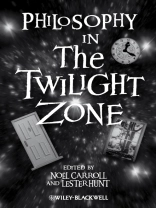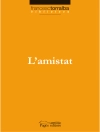Utilizing a series of essays examining the broad philosophical
concepts embedded in Rod Serling’s series, The Twilight
Zone, Philosophy in The Twilight Zone provides a
platform for further philosophical discussion.
* Features essays by eminent contemporary philosophers concerning
the over-arching themes in The Twilight Zone, as well as
in-depth discussions of particular episodes
* Fuses popular cult entertainment with classical philosophical
perspectives
* Acts as a guide to unearthing larger questions – from human
nature to the nature of reality and beyond – posed in the
series
* Includes substantial critical and biographical information on
series creator Rob Serling
Table of Content
Notes on Contributors
Introduction: Lester H. Hunt
1. ‘And Now, Rod Serling, Creator of The Twilight
Zone’: The Author as Auteur: Lester H.
Hunt
2. Tales of Dread in The Twilight Zone: A Contribution to
Narratology: Noël Carroll
3. Frame Shifters: Surprise Endings and Spectator Imagination in
The Twilight Zone: Carl Plantinga
4. The Treachery of the Commonplace: Mary Sirridge
5. Where is the Twilight Zone?: Richard Hanley
6. Existentialism and Searching for an Exit: Susan L.
Feagin
7. Through the Twilight Zone of Nonbeing: Two Exemplars of Race
in Serling’s Classic Series: Lewis R. Gordon
8. Blending Fiction and Reality: ‘The Odyssey of Flight
33′: Thomas E. Wartenberg
9. Epistemology at 20, 000 Feet: Sheila Lintott
10. Rationality and Choice in ‘Nick of Time’:
Aeon J. Skoble
11. ‘The Little People’: Power and the Worshipable:
Aaron Smuts
12. Nothing in the Dark: Deprivation, Death, and the Good Life:
James S. Taylor
Index
About the author
Noël Carroll is Distinguished Professor of Philosophy
at the Graduate Center of the City University of New York, a former
President of the American Society for Aesthetics, and a recipient
of the Guggenheim Fellowship. He has published numerous books
including the Philosophy of Horror (1990) and A
Philosophy of Mass Art (1999). He has also worked as a
journalist and has written five documentary pictures.
Lester H. Hunt is Professor of Philosophy at the
University of Wisconsin, Madison. He has also taught at
Carnegie-Mellon University, the University of Pittsburgh, and The
John Hopkins University. He has written extensively on ethics,
political philosophy, and the aesthetics of film, and is the author
of Nietzsche and the Origins of Virtue (1990) and
Character and Culture (1998). He is currently working on a
book on anarchy and the justification of the state.












